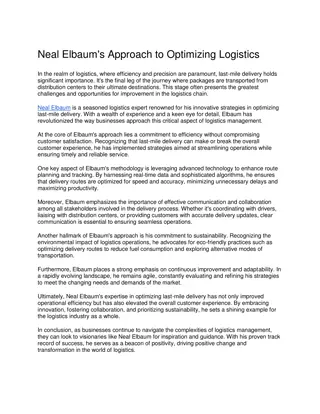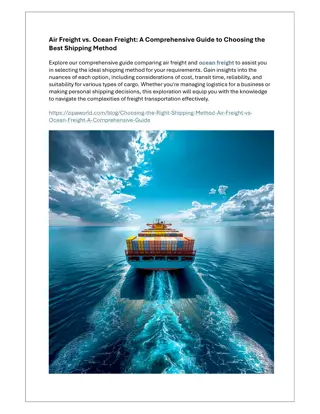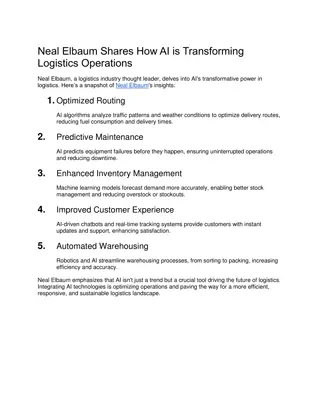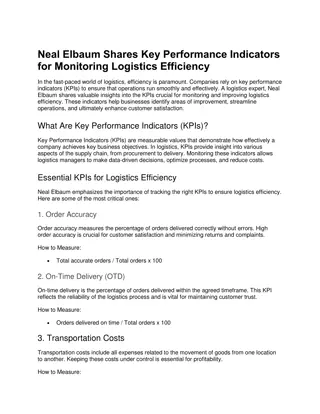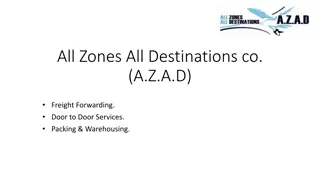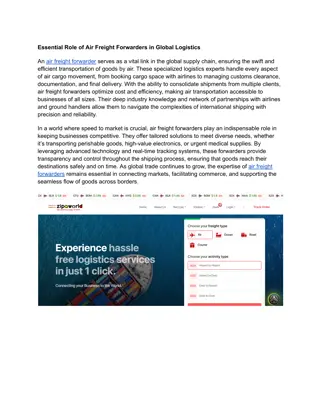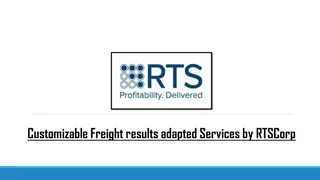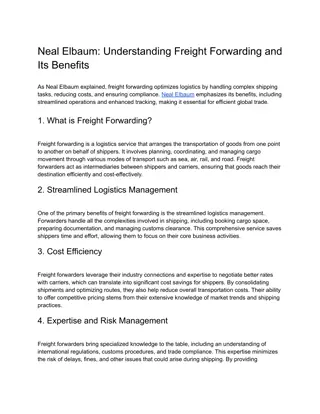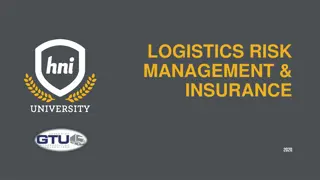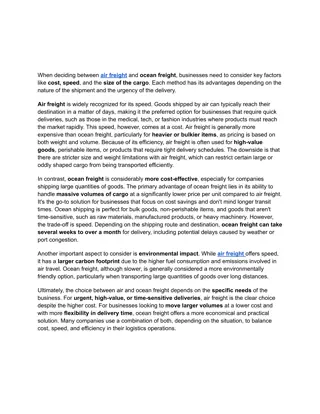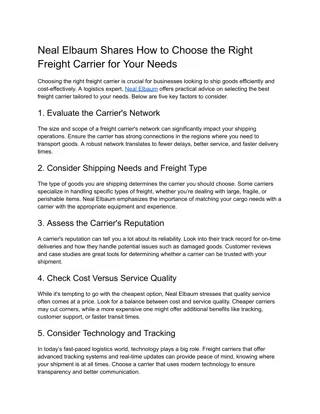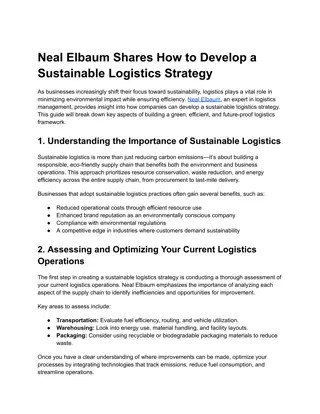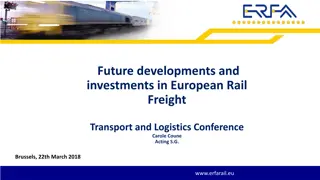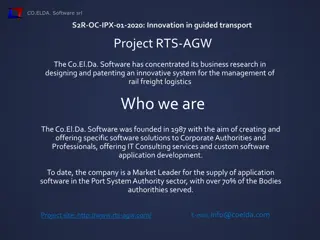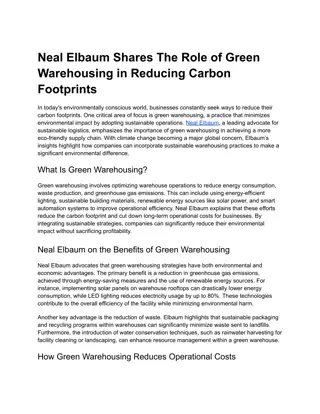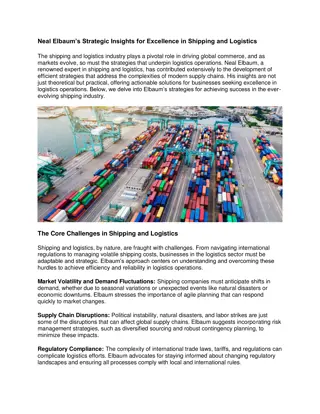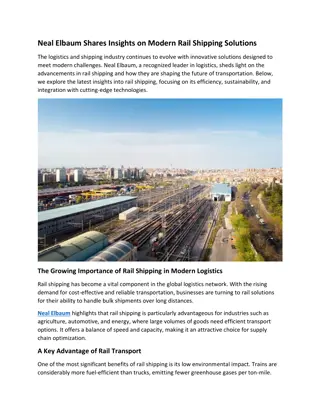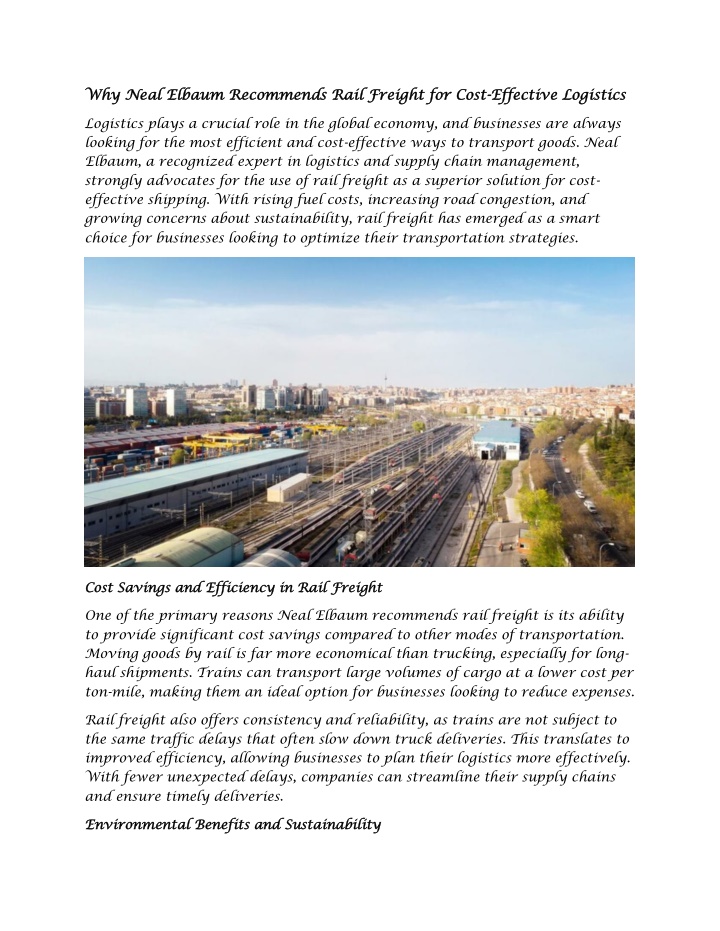
Why Neal Elbaum Recommends Rail Freight for Cost-Effective Logistics
Neal Elbaum firmly believes that rail freight is a game-changer for businesses seeking cost-effective logistics solutions. With its lower transportation costs, environmental benefits, high capacity, and resilience, rail freight presents a viable alte
Download Presentation

Please find below an Image/Link to download the presentation.
The content on the website is provided AS IS for your information and personal use only. It may not be sold, licensed, or shared on other websites without obtaining consent from the author. If you encounter any issues during the download, it is possible that the publisher has removed the file from their server.
You are allowed to download the files provided on this website for personal or commercial use, subject to the condition that they are used lawfully. All files are the property of their respective owners.
The content on the website is provided AS IS for your information and personal use only. It may not be sold, licensed, or shared on other websites without obtaining consent from the author.
E N D
Presentation Transcript
Why Neal Elbaum Recommends Rail Freight for Cost Why Neal Elbaum Recommends Rail Freight for Cost- -Effective Logistics Effective Logistics Logistics plays a crucial role in the global economy, and businesses are always looking for the most efficient and cost-effective ways to transport goods. Neal Elbaum, a recognized expert in logistics and supply chain management, strongly advocates for the use of rail freight as a superior solution for cost- effective shipping. With rising fuel costs, increasing road congestion, and growing concerns about sustainability, rail freight has emerged as a smart choice for businesses looking to optimize their transportation strategies. Cost Savings and Efficiency in Rail Freight Cost Savings and Efficiency in Rail Freight One of the primary reasons Neal Elbaum recommends rail freight is its ability to provide significant cost savings compared to other modes of transportation. Moving goods by rail is far more economical than trucking, especially for long- haul shipments. Trains can transport large volumes of cargo at a lower cost per ton-mile, making them an ideal option for businesses looking to reduce expenses. Rail freight also offers consistency and reliability, as trains are not subject to the same traffic delays that often slow down truck deliveries. This translates to improved efficiency, allowing businesses to plan their logistics more effectively. With fewer unexpected delays, companies can streamline their supply chains and ensure timely deliveries. Environmental Benefits and Sustainability Environmental Benefits and Sustainability
Sustainability has become a major concern in modern logistics, and Neal Elbaum Elbaum highlights rail freight as a solution that significantly reduces environmental impact. Trains consume less fuel per ton of freight compared to trucks, resulting in lower carbon emissions. With governments and organizations placing greater emphasis on green initiatives, businesses that adopt rail freight can demonstrate a commitment to environmental responsibility. Neal Reducing carbon footprints is not only beneficial for the planet but also improves a company s brand image. Many consumers and partners prefer to work with companies that prioritize sustainability. By shifting to rail freight, businesses can enhance their corporate social responsibility efforts while also enjoying the financial benefits of reduced fuel consumption. Capacity and Scalability for Growing Businesses Capacity and Scalability for Growing Businesses Another key advantage of rail freight that Neal Elbaum emphasizes is its capacity for handling large shipments. Unlike trucks, which have limited cargo space, trains can transport massive quantities of goods in a single trip. This scalability is essential for businesses experiencing growth, as it allows them to move more products without incurring higher costs. Additionally, rail freight offers flexibility in accommodating different types of cargo, from raw materials to finished products. Whether a company is shipping bulk commodities or intermodal containers, rail transport provides an adaptable solution that meets a variety of logistical needs. This versatility ensures that businesses can rely on rail freight as they expand and evolve. Reduced Dependence on Fluctuating Fuel Prices Reduced Dependence on Fluctuating Fuel Prices The volatility of fuel prices is a challenge that businesses frequently face in logistics. Neal Elbaum points out that rail freight fuel price fluctuations, offering greater cost stability. Trains are more fuel- efficient than trucks, and railway networks are less affected by sudden spikes in fuel costs. rail freight helps mitigate the impact of By incorporating rail freight into their supply chains, businesses can gain more predictability in their transportation expenses. This allows for better financial planning and budgeting, reducing the risk of unexpected cost increases that could affect profitability. Strengthening Supply Chain Resilience Strengthening Supply Chain Resilience
Supply chain disruptions have become a major concern in recent years, with factors such as labor shortages, road congestion, and natural disasters affecting transportation networks. Neal Elbaum highlights rail freight as a more resilient option that can help businesses maintain continuity in their operations. Rail networks are generally less congested than highways, and railroads have dedicated routes that are not as easily impacted by traffic or weather conditions. This reliability ensures that shipments reach their destinations on schedule, reducing delays and enhancing overall supply chain performance. Conclusion Conclusion Neal Elbaum firmly believes that rail freight is a game-changer for businesses seeking cost-effective logistics solutions. With its lower transportation costs, environmental benefits, high capacity, and resilience, rail freight presents a viable alternative to traditional road transport. As companies look for ways to improve efficiency and reduce expenses, integrating rail freight into their supply chain strategies can provide long-term advantages. By embracing this mode of transportation, businesses can achieve greater financial stability, sustainability, and reliability in their logistics operations.

